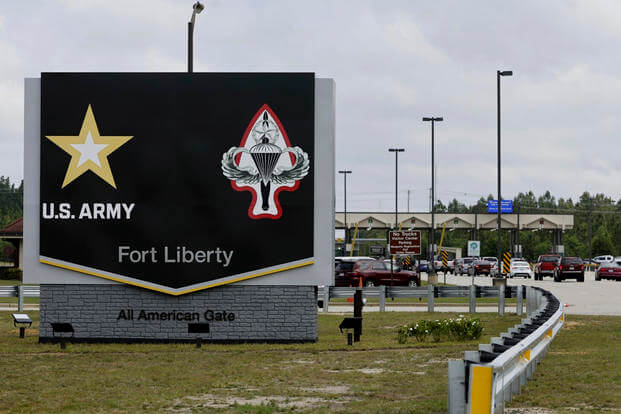A senior noncommissioned officer based out of Fort Liberty, North Carolina, faces numerous charges tied to a yearslong scheme to smuggle methamphetamine across the U.S.-Mexico border.
Military prosecutors say Sgt. Maj. Jorge E. Garcia, the career counselor for U.S. Army Forces Command, or FORSCOM, made numerous unauthorized trips abroad between 2021 and 2022, smuggled meth, lied to his unit about his whereabouts, engaged in fraudulent charges on his government travel card at a nightclub near the Pentagon, and coordinated the drug activity with gangs online.
It's the latest in a string of drug-related criminal activity from soldiers at Fort Liberty, the base previously known as Fort Bragg, and the highest-profile installation in the Army -- serving as the home of the 82nd Airborne Division and several of the service's elite special operations units.
Read Next: Army Suspends Ranger Training Battalion Commander as It Investigates Use of Online Dating App
Garcia, who has been in military pretrial confinement since June 2023, and his attorney could not be reached for comment ahead of publication. It was unclear as of Thursday whether Garcia had entered a plea to the military court or if he will face additional charges from a civilian court.
Court documents say Garcia traveled abroad or lied about his whereabouts at least five times since 2021. Authorities said at least one of those occasions included travel to Tijuana, Mexico. That trip included "cyber-related activities" in support of "a criminal gang by promotion of such activity ... with the knowledge that such activities involve an extremist cause."
Garcia was seemingly caught in May 2023 at San Ysidro, a border town in California just outside of San Diego. Authorities found him with about 24 pounds of methamphetamine, a highly potent illegal stimulant, "with intent to distribute," court records show.
Garcia also allegedly accrued a $241.89 charge at The Flirt Lounge in Arlington, Virginia -- a nightclub less than two miles from the Pentagon -- in October 2021 on his government travel card.
The news follows the 15-year sentencing of Gordon Custis last month, a former Fort Liberty soldier who held the rank of specialist and served as a medic, for trafficking ketamine while on duty and laundering more than $700,000. His wife, Sgt. Shabrea Bright, was also indicted in the scheme and is awaiting trial.
Fort Liberty has the most overdose deaths among all military installations, according to Pentagon data, with 31 deaths between 2015 and 2021.
Early last year, at least 13 soldiers assigned to the Army's Special Operations Command were under investigation for drug trafficking.
The base is in the so-called Corridor H, a designation from the Justice Department of eight different parts of the country in which drugs, particularly fentanyl, are heavily trafficked. That corridor encompasses I-95, a highway that stretches from Miami to Houlton, Maine.
In March 2022, Spc. Jacob Dickerson was sentenced to 75 days in prison, removed from the service and given a bad-conduct discharge after a plea agreement, according to Army court records.
Dickerson was a military police officer at Fort Liberty who sold oxycodone, an opioid used to treat pain, out of his military police vehicle at least once. He was assigned to the 21st Military Police Company, 503rd Military Police Battalion, which is part of the 16th Military Police Brigade.
Related: More Than a Dozen Special Operations Soldiers at Center of Drug Trafficking Probe











